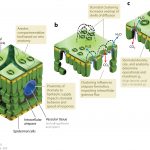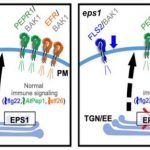New Teaching Tool, “Three-Way Interactions between Plants, Microbes, and Arthropods (PMA): Impacts, Mechanisms, and Prospects for Sustainable Plant Protection”
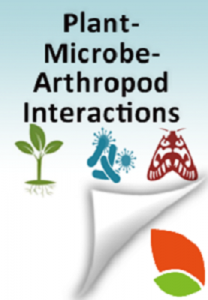 We’re excited to announce the publication of The Plant Cell’s latest Teaching Tool, “Three-Way Interactions between Plants, Microbes, and Arthropods (PMA): Impacts, Mechanisms, and Prospects for Sustainable Plant Protection,” by Maria J. Pozo, Benedicte R. Albrectsen, Eduardo R. Bejarano, Eduardo de la Peña, Salva Herrero, Ainhoa Martinez-Medina, Victoria Pastor, Sabine Ravnsko, Mary Williams, and Argen Biere, available without subscription in the July 2020 issue of The Plant Cell.
We’re excited to announce the publication of The Plant Cell’s latest Teaching Tool, “Three-Way Interactions between Plants, Microbes, and Arthropods (PMA): Impacts, Mechanisms, and Prospects for Sustainable Plant Protection,” by Maria J. Pozo, Benedicte R. Albrectsen, Eduardo R. Bejarano, Eduardo de la Peña, Salva Herrero, Ainhoa Martinez-Medina, Victoria Pastor, Sabine Ravnsko, Mary Williams, and Argen Biere, available without subscription in the July 2020 issue of The Plant Cell.
Download the resources here.
Plants constantly interact with numerous of organisms and the outcome of these interactions determines plant health and growth. In other words, the phenotype of a plant is not only the result of the plant’s interaction with abiotic conditions, but also of multiple interactions in the living environment surrounding the plant, the phytobiome. In this Teaching Tool, we have focused on interactions between plants, microbes and arthropods (PMA). The organism groups that contribute to PMA interactions are presented as well as types of interactions between them, along with multiple examples of simple and more complex PMA interactions. The underlying mechanisms of plant responses are described in detail as well as the evolutionary aspects of PMA interactions. Finally, the use of PMA interactions for crop protection in sustainable plant production that supports the UN Sustainable Development Goals for 2030 is proposed.
Several authors contributed to this Teaching Tool, providing their breadth of perspectives and expertise. This Teaching Tool resulted from discussions and collaborations within a recent COST Action (FA1405), “Using three-way interactions between crops, microbes and arthropods to enhance crop protection and production” (2015–2019). COST is the European Union-funded European Cooperation in Science and Technology a funding organization for the creation of research networks, called COST Actions, that create an open space for collaboration among scientists across Europe (and beyond) to advance research and innovation in particular area.
 Maria J. Pozo is a passionate plant microbiologist and a scientific researcher at the Estación Experimental del Zaidín (Spanish National Research Council-CSIC-) in Granada, Spain. After earning her PhD in plant biology at Granada University, she initiated her research career in pioneer labs in the field of beneficial microbes and plant protection at CSIC, Texas A&M University and Utrecht University. Her research focuses on the intriguing effects of beneficial soil microbes -especially mycorrhizal fungi- on plant tolerance to stresses, paying special attention to the regulation of plant immunity during their interaction, and its impact on above- and below-ground biotic interactions. She is particularly interested in the molecular regulation of plant defenses during the symbiosis, the potential to boost plant immunity leading to systemic resistance against pathogens and pests, and how the environmental context can impact the symbiosis effects on plant health. Her group aims to optimize the biotechnological applications of microbial inoculants for plant defense priming and sustainable crop protection… an exciting challenge!
Maria J. Pozo is a passionate plant microbiologist and a scientific researcher at the Estación Experimental del Zaidín (Spanish National Research Council-CSIC-) in Granada, Spain. After earning her PhD in plant biology at Granada University, she initiated her research career in pioneer labs in the field of beneficial microbes and plant protection at CSIC, Texas A&M University and Utrecht University. Her research focuses on the intriguing effects of beneficial soil microbes -especially mycorrhizal fungi- on plant tolerance to stresses, paying special attention to the regulation of plant immunity during their interaction, and its impact on above- and below-ground biotic interactions. She is particularly interested in the molecular regulation of plant defenses during the symbiosis, the potential to boost plant immunity leading to systemic resistance against pathogens and pests, and how the environmental context can impact the symbiosis effects on plant health. Her group aims to optimize the biotechnological applications of microbial inoculants for plant defense priming and sustainable crop protection… an exciting challenge!
“The intricate connections between plants, microbes and arthropods are fascinating and have important effects on plants health and ecosystems functioning. The relevance of these three-way interactions in nature has been traditionally disregarded. In the last years, multidisciplinary approaches and joint research efforts have brought to light their relevance and some of the regulatory mechanisms shaping them, as highlighted in the COST Action FA1405 international network. We hope that these teaching tools will provide students and researchers with a basis to understand the complexity of cross-kingdom interactions and their potential biotechnological applications. These tools hopefully will encourage new investigations to widen our knowledge in this exciting area of biology.”
 Benedicte R. Albrectsen is an ecologist and plant biologist specialised in plant biotic stress responses at Umeå University, Sweden. Her research follows two major research interests: 1. the evolution of specialized metabolism in plants and 2. the metabolic dynamics of stress responses in plants. Scientific insights from the Albrectsen laboratory are often reached through experiments with the model plant systems: Populus, Arabidopsis or Brassica and with use of metabolomic and transcriptomic approaches. Work on three-way interactions from the Albrectsen lab have focused on the plant’s ability to filter colonizing microorganisms depending on the host (its genotype and chemical profile) and on abiotic and biotic environmental factors, including herbivore feeding damage. Dr. Albrectsen achieved her PhD and professors’ competence in Forest Ecology at the Swedish University of Agricultural Sciences. Dr. Albrectsen currently leads the education in plant defence chemistry and plant biotic stress at the Department of Plant Physiology, Umeå University, Umeå Plant Science Centre, Sweden, which has been a great motivation for participating in the development of the teaching tools.
Benedicte R. Albrectsen is an ecologist and plant biologist specialised in plant biotic stress responses at Umeå University, Sweden. Her research follows two major research interests: 1. the evolution of specialized metabolism in plants and 2. the metabolic dynamics of stress responses in plants. Scientific insights from the Albrectsen laboratory are often reached through experiments with the model plant systems: Populus, Arabidopsis or Brassica and with use of metabolomic and transcriptomic approaches. Work on three-way interactions from the Albrectsen lab have focused on the plant’s ability to filter colonizing microorganisms depending on the host (its genotype and chemical profile) and on abiotic and biotic environmental factors, including herbivore feeding damage. Dr. Albrectsen achieved her PhD and professors’ competence in Forest Ecology at the Swedish University of Agricultural Sciences. Dr. Albrectsen currently leads the education in plant defence chemistry and plant biotic stress at the Department of Plant Physiology, Umeå University, Umeå Plant Science Centre, Sweden, which has been a great motivation for participating in the development of the teaching tools.
“We only start to understand how microbes may boost plant health directly and indirectly. Therefore, the potential is huge to work with nature and support healthy microbe-insect-plant interactions for modern plant production. An essential step on the way is to characterise the microbes and determine their ecological function. This teaching tool presents the basics theory behind these complex interactions and aims to support curiosity about the topic while at the same time provide a solid foundation for students who aim at a professional career in modern sustainable plant production.”
 Eduardo R Bejarano is a plant molecular virologist and a scientific researcher at The Institute for Mediterranean and Subtropical Horticulture “La Mayora” (UMA-CSIC) in Málaga, Spain. He obtained his PhD from the University of Seville and initiated his scientific life in plant virology during a post-doc at Imperial College (UK). His research is focused in the plant-virus-vector interactions using as model plant viruses transmitted by whiteflies. He is particularly interested in understanding the mechanism underlining the plant interaction with the virus and the insect and how abiotic factors affect those interactions. He is captivated by how, in spite of their genome size constraints and the concomitant limited coding capacity, viruses reshape the plant intracellular environment to suit their needs and guarantee their transmission. He is also a professor at the University of Malaga, where he teaches genomic and molecular genetics.
Eduardo R Bejarano is a plant molecular virologist and a scientific researcher at The Institute for Mediterranean and Subtropical Horticulture “La Mayora” (UMA-CSIC) in Málaga, Spain. He obtained his PhD from the University of Seville and initiated his scientific life in plant virology during a post-doc at Imperial College (UK). His research is focused in the plant-virus-vector interactions using as model plant viruses transmitted by whiteflies. He is particularly interested in understanding the mechanism underlining the plant interaction with the virus and the insect and how abiotic factors affect those interactions. He is captivated by how, in spite of their genome size constraints and the concomitant limited coding capacity, viruses reshape the plant intracellular environment to suit their needs and guarantee their transmission. He is also a professor at the University of Malaga, where he teaches genomic and molecular genetics.
“The study of the complexity of phytobiomes is one of the main challenges for plant biology in this century. Understanding their function will allow us to develop a sustainable and profitable agriculture system to meet global demands while reducing the impact on the environment. Those analyses will be possible under the collaboration of multidisciplinary teams able to use different approaches to study their molecular, ecological and agronomic features. COST Action FA1405 has been a superb example of that type of cooperation. Being part of this action has been a fascinating scientific experience, firing further my enthusiasm in science. Among the outcomes of the COST Action, this teaching tool is a marvellous instrument to offer the teaching community the current knowledge underlying the three-way interactions among plants microbes and pests.”
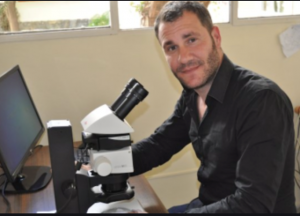 Eduardo de la Peña is an entomologist interested in the study of multitrophic interactions in agroecosystems. He obtained his PhD in 2006 at Ghent University, Belgium. He is currently Scientific Officer in the Plant Health Service of the European Food Safety Authority, a scientific agency of the European Union where he is coordinating two working groups on pest risk assessments of agricultural commodities and on the development of new methodologies in pest surveillance. Moreover, he lectures at Ghent University where he is involved in the International Master Programme in Plant Nematology and in several courses related to general ecology and biological control of insect pests.
Eduardo de la Peña is an entomologist interested in the study of multitrophic interactions in agroecosystems. He obtained his PhD in 2006 at Ghent University, Belgium. He is currently Scientific Officer in the Plant Health Service of the European Food Safety Authority, a scientific agency of the European Union where he is coordinating two working groups on pest risk assessments of agricultural commodities and on the development of new methodologies in pest surveillance. Moreover, he lectures at Ghent University where he is involved in the International Master Programme in Plant Nematology and in several courses related to general ecology and biological control of insect pests.
“College and university students in Biology, Agriculture, Agronomy, Environmental Sciences are very much interested in multitrophic interactions in agro- and natural systems, however until now information regarding plan-insect-microbe interactions was rather scattered. The pieces of evidence and the mechanisms to understand this topic were coming from different disciplines in plant pathology and entomology. I think that this teaching tool is the first comprehensive didactic material on this fascinating topic and will be for any student or researcher a perfect basis to understand species interactions and the mechanism that are ruling them in nature.”
 Salva Herrero is an Associate Professor in the Department of Genetics at the University of Valencia, Spain. He obtained his PhD investigating the mechanism of insect resistance to Bacillus thuringiensis and Bt-crops. After a postdoctoral period at Wageningen University & Research he gained interest and experience in viral entomopathogens. Since then, his research focuses on understanding the mechanism underlining the insect’s interaction with its viral and bacterial pathogens, somehow specializing in insect virology and pathology. In the last years, one of the main research topics in his lab is exploring the influence of plants on the insect-entomopathogen interactions.
Salva Herrero is an Associate Professor in the Department of Genetics at the University of Valencia, Spain. He obtained his PhD investigating the mechanism of insect resistance to Bacillus thuringiensis and Bt-crops. After a postdoctoral period at Wageningen University & Research he gained interest and experience in viral entomopathogens. Since then, his research focuses on understanding the mechanism underlining the insect’s interaction with its viral and bacterial pathogens, somehow specializing in insect virology and pathology. In the last years, one of the main research topics in his lab is exploring the influence of plants on the insect-entomopathogen interactions.
“It is fascinating the level of complexity and specialization being discovered in the three-way interactions between plants, microbes, and arthropods. I’m convinced that exploring the genetic diversity in plants will provide new ways of improving the use of entomopathogens in pest control.”
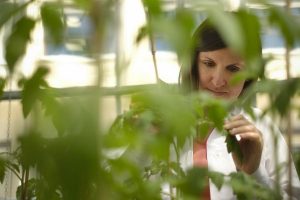 Ainhoa Martinez-Medina is a Junior Group Leader at the Institute of Natural Resources and Agrobiology of Salamanca, from the Spanish National Research Council (IRNASA-CSIC). She is primarily interested in how plants interact with multiple organisms in their environment, and how they are able to integrate multiple signals in order to optimize their growth and health. Thanks to a personal grant from the program of Attracting Scientific Talent to Salamanca (from Salamanca Ciudad de Cultura y Saberes, and Ayuntamiento of Salamanca), her group is currently studying how beneficial microbes from the root microbiome can trigger plant immunity against pathogens and pests.
Ainhoa Martinez-Medina is a Junior Group Leader at the Institute of Natural Resources and Agrobiology of Salamanca, from the Spanish National Research Council (IRNASA-CSIC). She is primarily interested in how plants interact with multiple organisms in their environment, and how they are able to integrate multiple signals in order to optimize their growth and health. Thanks to a personal grant from the program of Attracting Scientific Talent to Salamanca (from Salamanca Ciudad de Cultura y Saberes, and Ayuntamiento of Salamanca), her group is currently studying how beneficial microbes from the root microbiome can trigger plant immunity against pathogens and pests.
“Plant-Microbe-Arthropod (PMA) three-way interactions is a complex and broad topic, so it is generally divided in Plant-Microbe and Plant-Arthropod two-way interactions. However, PMA interactions cannot be predicted from the underlying two-way interactions. This teaching tool provides a wonderful opportunity for teachers and students for having an integrated view of these important three-way interactions. We are positive that this didactical tool will be valuable for teachers, students in different areas of plant biology, and the general plant community.”
 Victoria Pastor is an assistant professor at University Jaume I (Castelló, Spain), in the Department of Agrifood Sciences and Natural Environment, assigned to Plant Physiology Section. She graduated in Chemistry and specialized in Agrochemistry at University of Alicante. She got her PhD in 2012 at the University Jaume I, looking for the implications of reactive oxygen species in plant defense priming against pathogenic fungi. Her main research interest is in molecular and metabolomic mechanisms underlying adaptive immune response in plants. Specifically, the adaptive response called priming, using mostly Arabidopsis and tomato plants as a model plants, and using chemical agents and mycorrhiza fungi as a priming tool to enhance resistance against pests and pathogens.
Victoria Pastor is an assistant professor at University Jaume I (Castelló, Spain), in the Department of Agrifood Sciences and Natural Environment, assigned to Plant Physiology Section. She graduated in Chemistry and specialized in Agrochemistry at University of Alicante. She got her PhD in 2012 at the University Jaume I, looking for the implications of reactive oxygen species in plant defense priming against pathogenic fungi. Her main research interest is in molecular and metabolomic mechanisms underlying adaptive immune response in plants. Specifically, the adaptive response called priming, using mostly Arabidopsis and tomato plants as a model plants, and using chemical agents and mycorrhiza fungi as a priming tool to enhance resistance against pests and pathogens.
“Plant-microorganisms-arthropods’ interactions are amazingly complex in nature. To understand such complexity, we should integrate studies from ecological aspects to molecular mechanisms. Nevertheless, most previous scientific approaches have been focused on two-way interaction. Introducing additional players will allow to consider a more realistic picture. Understanding the synergies and antagonisms between plants, microbes and arthropods, will contribute to a better integrated pest management, and therefore, an optimal use of natural resources.”
 Sabine Ravnskov is an associate professor at Aarhus University in Denmark.She received her PhD degree in plant and soil microbiology in 1998 from University of Copenhagen (Denmark). Her research focus is still on the phytobiome concept with special emphasis on the consequence of the arbuscular mycorrhizal symbiosis interactions with the biotic and abiotic environment for plant health and growth.
Sabine Ravnskov is an associate professor at Aarhus University in Denmark.She received her PhD degree in plant and soil microbiology in 1998 from University of Copenhagen (Denmark). Her research focus is still on the phytobiome concept with special emphasis on the consequence of the arbuscular mycorrhizal symbiosis interactions with the biotic and abiotic environment for plant health and growth.
“Beside my research, teaching of students is of high priority for me; I teach BSc. students in mycology and plant-microbe interactions, MSc. students in biological management of plant diseases, and soil biology and fertility as well as supervising PhD students. I see publication of teaching tools as a great opportunity for lecturers to share and increase quality of university teaching worldwide.”
 Arjen Biere is a senior researcher in the Department of Terrestrial Ecology of the Netherlands Institute of Ecology in Wageningen, The Netherlands. His research focuses on the evolutionary ecology of multitrophic interactions between plants and their pathogens, insect herbivores, and symbionts including arbuscular mycorrhizal fungi. He is fascinated by understanding plant-mediated interactions between below- and aboveground organisms in the plant-associated food web, and how these interactions are affected by environmental change. He obtained his PhD from the University of Groningen and gained a life-time interest in multitrophic interactions during a post-doc at Duke University (NC).
Arjen Biere is a senior researcher in the Department of Terrestrial Ecology of the Netherlands Institute of Ecology in Wageningen, The Netherlands. His research focuses on the evolutionary ecology of multitrophic interactions between plants and their pathogens, insect herbivores, and symbionts including arbuscular mycorrhizal fungi. He is fascinated by understanding plant-mediated interactions between below- and aboveground organisms in the plant-associated food web, and how these interactions are affected by environmental change. He obtained his PhD from the University of Groningen and gained a life-time interest in multitrophic interactions during a post-doc at Duke University (NC).
“We urgently need to reduce fertilizer and pesticide input in agriculture and horticulture. Using beneficial microbes to enhance plant growth and resistance to arthropod pests is one of the promising avenues towards more sustainable agriculture. But this requires in-depth knowledge of the mechanisms, effects, and environmental dependence of the underlying three-way interactions between plants, microbes and pests. With this TTPB we want to share our knowledge to train future generations of plant biologist that will need the multidisciplinary skills to tackle this challenge. Compiling this TTPB has been a very rewarding experience for me. It has been the result of a very nice collaborative effort initiated within COST Action FA1405 funded by the European Cooperation in Science and Technology association, that led to many new friendships and collaborations, and I hope the TT will inspire many new students in the field.”



